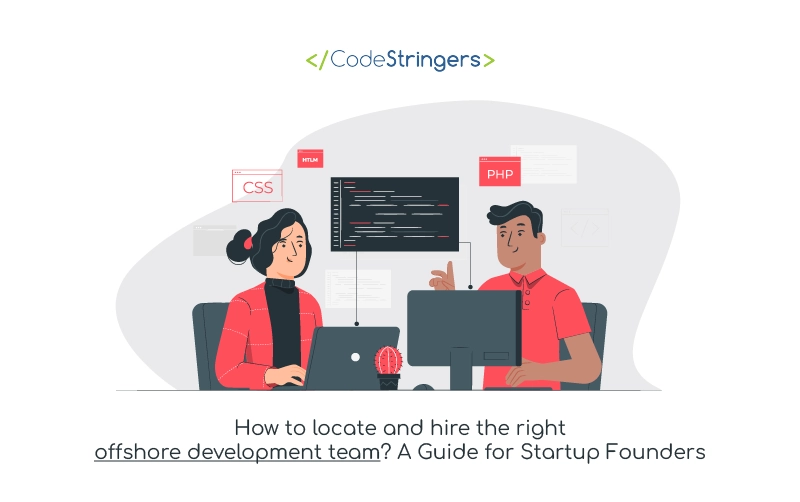If you’re starting a new tech business, finding the right development team can be one of the most important decisions you make. But how do you find the right team?
The first decision you’ll need to make is whether to develop in-house vs outsource. Then secondly, if you outsource, you’ll need to decide between onshore and offshore development team. We’ve discussed both of those decision points in previous articles. Today, we’re going to focus on finding an offshore development team that’s a perfect fit for your business. We’ll also address some common questions and concerns that potential clients typically have.
Why hire an offshore development team for your startup?
“Team” is the operative word here. You’re going to want to have a group of people who work well together. Ideally they work in the same physical location at least part of the time. Otherwise, you’re going to have to be a full-time traffic cop trying to tie together the disparate pieces of the development, quality assurance, and business analysis resources. If these people are all in different countries, you’re in for an outsourcing nightmare.
Conversely, development teams who know each other and work well together are easier to coordinate and, therefore, perform better. The specific reasons are fairly technical – the business analyst needs to have a good sense of what QA is going to test, and the developers need to respect the decisions of the QA and development teams. However, you can also use common sense to understand this concept. Wouldn’t a soccer/football team that is used to playing together always be better than a random group of 11 players who don’t know each other?
How to find the right offshore development team in six easy steps
1. Start with a business goal – what problem is your technology solving?
Before you start looking for developers, start with a clear business goal. Determine the customer need that you are addressing and how your product will be able to meet that need better than the competition can.
This question is significant since it influences all of your subsequent actions. You are going to want a team that understands your goals and is able to work with you on achieving them.
2. Find a trusted product manager
You are certainly going to need somebody in your organization to oversee the planning and building of the tech product. This person will be responsible for: a) determining all the features that your product will have; b) thinking of all the possible situations in which your product will be used; c) making sure your product can perform in those situations; d) finding the resources needed to build your product; and e) getting your product built on time and on budget.
It’s going to be a full time job. If you want to do it yourself, you will have to hire someone else to do your CEO job. So you’ll probably want to hire someone. Make sure you trust them because they will be crucial to your success.
3. Build a preliminary product plan
The next stage is to make a list of all the features that you want your product to have. Start with basic features such as: sign-up, log on, log off, forgot password, etc. Then, include the “sexy” features that will tie in with your business goal from step 1. For example, if you were building a product plan for Airbnb, you would have one feature that would say “I want to be able to upload pictures of my space”, and “I want to look at a map and search for all properties for rent on a certain date in a certain area.”
Your product manager will lead this effort and it will be a good opportunity to see how well the product manager works with the CEO.
4. Identify the required skill sets
After you have the requirements, you will need to determine the experience, technology, and skills required for the project. If you’re building a mobile app, for example, you’ll need Swift and Java developers. If you’re building an AI application, you’ll need a Python developer. You’ll also need business analysts to manage the task list and QA to ensure that your requirements are being met without errors.
5. Plan your budget
When you have all of the requirements, technologies, and skill sets, you can finally create a budget. The budget will be a constantly moving target, but it is an essential tool that ensures that the product meets your business goals.
This will most likely be the point in which you start discussing in-house vs outsourced and offshore vs onshore. Assuming you pick offshore, you’ll also need to decide which country is best for you.
6. Build your team!
This will be one of your biggest challenges. You need to find human resources that meet both your performance requirements and your budget. Also, as we mentioned before, you want a team that works well together. But how?
Your first option is to recruit them yourself using one or more of the below methods:
- Tech recruiting companies
- Freelance websites: Upwork, Fiverr
- Professional networking tools such as: LinkedIn, GitHub
Your second option is to find an outsourcing company. If you don’t know of any through your own personal network, you can find one through tech company directories such as: G2, Upcity, ITFirms, Clutch, Goodfirms. However, if you choose to work with an outsourcing firm, make sure you screen them properly to make sure you found the right one. For guidance on this, either take a look at the below section or check out our previous article on the topic.
Inside Tips on finding the right offshore development team
Lookup their profile
It may sound like common sense, but you can start your research with a simple Google search. You can also look at their profiles on industry-specific sites such as Clutch, Design Rush, et al, to see their current clients. Be aware, however, that the best online profiles are usually the results of the best marketers, not necessarily the best developers. So if you pick a high profile firm, make sure to ask the right questions!
Make sure the company’s work style vibes with yours
Every client and every vendor has a culture and a personality. Some work well together, some don’t. For example, if your company is very “hands-on” and wants to manage the day-to-day development, you won’t work well with a company that is 12 time zones away unless you want to stay up all night.
Therefore, it’s critical to ask the outsourcing company about their work processes.
Reject the cheapest quotes
The lowest quote is frequently part of a ruse in which the vendor makes promises that the provider never keeps. If a quote looks too good to be true, it probably is. Honest bidding will ultimately save you money in the long run. For more about honest bidding, see our previous blog post.
Ask if the company can deliver on all your requirements
If the supplier says they can literally meet all of your requirements, carefully reconsider. Startup projects often have special requirements and it requires the supplier to make some resource adjustments to meet them. To ensure that the vendor has properly analyzed the criteria, have them thoroughly explain their plan. If they admit that they need to recruit in order to fill some specific skill requirements, they’re probably an honest vendor.
FAQ to outsourcing vendors
We often get the following questions from potential clients.
As mentioned above, the most significant benefit of employing an offshore development team for a startup is cost-effectiveness. If you find the right team, you can get a top notch team for a fraction of the price in the US or Western Europe.
That depends on your project and requirements. We also have a blog post that explores this in detail. Perhaps, however, it may be useful to refer to the 2021 Kearney Global Services Location Index which ranked countries based on skill sets, cost-effectiveness, business environment, etc. The top 6 countries were: China, India, Malaysia, Indonesia, Brazil, and Vietnam.
Hopefully by now we’ve convinced you that, for 90+% of businesses, it makes more sense to hire an agency. You’re more likely to get a team that works well together, and it will be far less work for you.
Conclusion
In this post, we discussed why you should use an offshore development team and the challenges that come with it. We also demonstrated how to find an effective offshore team, and the value of teamwork in technology.
If you have any questions or if you’d like to discuss your business idea, please feel free to give us a call.
CodeStringers






